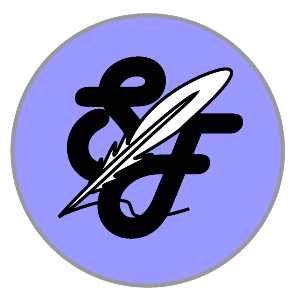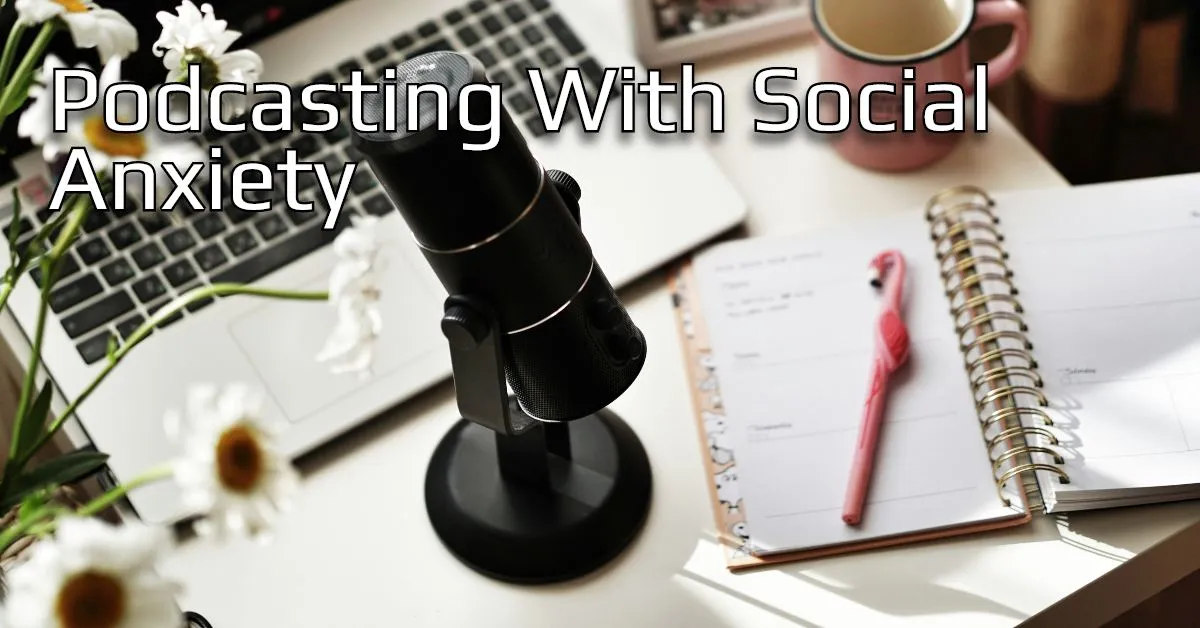My writing home is Speculative Fiction Writers Association. The members are incredibly accepting of imaginative writers. If I ask about recent changes to Einstein’s theories or where forest elves live… they can help. When it comes to the craft of writing, the group gives lots of advice, and they have high expectations. Members happen to like audio-books and podcasts.
I Was Enchanted by Podcasts
I watched several podcast interviews and wanted to try podcasting. The group was supportive, as usual. It’s no secret that I came away from my military service with some PTSD. Writing is hard enough for me. I wondered if the diagnosis would be a barrier to podcasting. Could I stand the anxiety of doing a public presentation? Here’s how the story came out:
Not Just Stage Fright
I’m a newb to podcasting, so I can’t give you the lowdown on all the secrets. Instead, I can give you the rundown on how I cope with my social anxiety so I can talk about what’s on my mind.
How I Chose the Format for My Podcast
I chose a solo podcast format to share my healing and art journey, plus psychological tips I’ve learned along the way. I interview people so they can share their stories and their message. Anything that may encourage people to be themselves and express their truth. I have dissociative symptoms that cause identity stress, so the podcast helps me relearn what I already know. I plan to read snippets of my novels as I write and talk about the story behind it.
What is Social Anxiety?
Social anxiety can stem from many areas. With a history of complex traumas, many fears resurface until I second-guess not only my ability to do something, but I question my desire to do it. Doubts come up, causing me to consider myself egotistic or selfish for wanting to share any part of my life. I go back and forth between desire and doubt until I remember why I started.
Is Podcasting Therapy?
It might be. I work with a therapist and a Wounded Warrior Project Talk Partner, the first for topics surrounding life, business, and love, and the second for business motivation. Listening to my previous episodes helps, too. But, my main intent is to communicate with others.
My Audience
I hope my audience will be people who have PTSD, rape trauma syndrome, or those who want to know more about the problems. Since I am a speculative fiction writer, perhaps other writers may want to learn more about the topic to make their fictional characters with PTSD more real. Also, special thanks to Amber Herbert for introducing me to the Speculative Fiction Writers group, as I’ve gained more creative ideas since I know many people like the story I’m telling!
My Process
When I first think of a subject, I write it down with a list of other topics I’d like to discuss. So far, I have at least fifty topics, from “handling burnout as a writer” to “sexual healing isn’t all about sex.” I have to let the ideas simmer. Otherwise, I feel like I don’t know enough about the topic to add value.
Once I decide on a topic, I mind map, figuring out what I want to include in the episode. I do extra research to refresh my memory, as well. I might write bullet points afterwards, though anything beyond a word or two can distract me and cause me to lose my place. Scripting is too rigid and triggers me.
The Key to Lower Stress is Preparation
My de-stress warm-up can go like this (though not always): I soak in the tub while listening to a podcast, followed by a shower sing, using my “Soothing Impostor Syndrome” Spotify playlist. I call this a “shathower sing,” the time where I access the creative and driven parts of my spirit. I then do yoga if I have tense muscles, sit down, and start recording. I use these coping skills and others, such as nature walks (season permitting) and gaming, before writing.
Music is Important
I use Zoom for my recording, as the video service records the audio and video in separate files. This makes it easier for me to add music (from my husband’s Bandcamp page) using Video Pad editor. I’m sure there are better ways to do this, but I’m fine with my routine until I I get used to the social aspect of podcasting. My husband bought me a podcasting kit for Christmas a few years ago; his support helps me stay motivated.
The Shure MV7 podcasting kit (not sponsored) works well, if you don’t press the mute button while plugging it in. That gets embarrassing…
To Edit or Not Edit?
After the recording processes, I listen to my recording and edit as needed. Keep in mind I like to be as raw as possible, so unless they’re horrible flubs, I leave them in. If I feel pleased with the recording, I add the music and edit it, including adjusting the volume level to seven or less. Then, I export the file and upload it to Spotify for Podcasters (also not sponsored). If I’m not pleased with it, I re-record it, on the same day or the next, depending on my energy levels and emotions.
Quality Product
Spotify has certain requirements for their audio and video. If the file doesn’t meet them at first, their assessment system will notify you of what they need.
After you upload, you can add a season and episode number, an image, a description, and more.
Podcasting can be fun or it can be stressful. Sometimes it’s both. Learn what you can, take notes, and mentally prepare yourself for vocal stardom. It’s hard to know what you can and can’t do unless you try it. Find a topic you like, access your passion, and go for it!
Next Steps
I’m looking for more people to interview, focusing on mental health and creativity. If you’re interested, please get in touch (see my bio below). Hey writers, if you have characters with PTSD and need some insight, let me know.
Throughout her life, Kara has struggled to understand who she is under the surface. Without understanding herself, she dissociated and lived in her fantasy world, ignoring the traumatic issues in her life, compartmentalizing them inside herself. When past therapists pushed her towards prolonged exposure therapy, she didn’t have healthy coping skills. Instead, she exposed herself to her past traumas through discovery writing. Fantasy light drenched with pain.
Kara SB Brown is the self-published author of The Scarring of the Roshanra, the first published in a potentially 13-book series. Her current project is the new first book in the series, set fifteen years before her debut novel. She has spin-off character story ideas in mind for after the series end, which she plots as she goes.
She writes multiple POVs to empathize with herself and others, learning psychology and connecting to her lost loved ones. When not writing, she reads, sings, draws, and paints, explores various aspects of life. She also spends plenty of quality time with her husband, whom she met in Afghanistan. Their two dogs (Lana and Starling) and two cats (Corn and Oscar) earn spots in her writing, as well.
You can find The Scarring of the Roshanra on Amazon in paperback and ebook. https://www.amazon.com/Scarring-Roshanra-Kara-SB-Brown/dp/1736817418

